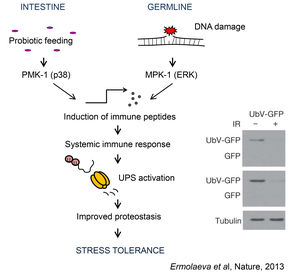Ermolaeva Research Group
Stress Tolerance and Homeostasis:
What doesn't kill us makes us stronger
Maria Ermolaeva’s Research Group "Stress Tolerance and Homeostasis" uses nematode C. elegans and mammalian cell and organoid cultures to identify changes of metabolism and stress responses, which occur during aging. The group studies connections between such changes and tissue degeneration during aging with special focus on neuronal aging and protein aggregation disorders and with the outlook of attenuating these detrimental processes.
The Ermolaeva lab performs mutagenesis based forward genetic screens in nematodes and human cells to identify gene changes, which protect from aging-relevant cellular stresses such as mitochondrial stress and protein folding stress in the endoplasmic reticulum. This is done with the outlook of developing inhibitors to be used as stress-protective treatments ensuring cell survival and organ maintenance during aging.
The group uses nematodes as cost-effective model hosts for studying host-microbiome interactions during aging at a mechanistic level and in a high throughput manner. In this scientific area host effects of both environmental and human (commensal and pathogenic) microbes are researched. The goal of this research is to (a) develop new probiotics and identify microbial metabolites with pro-longevity effects and (b) understand how specific constituents of human microbiome affect host homeostasis and the process of aging.
Contact

Maria Ermolaeva
Group Leader
+49 3641 65-6805
maria.ermolaeva@~@leibniz-fli.de
Eileen Stöckl
Assistance
+49 3641 65-6815
eileen.stoeckl@~@leibniz-fli.de










